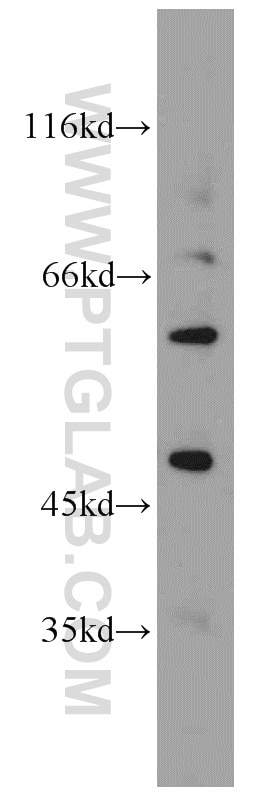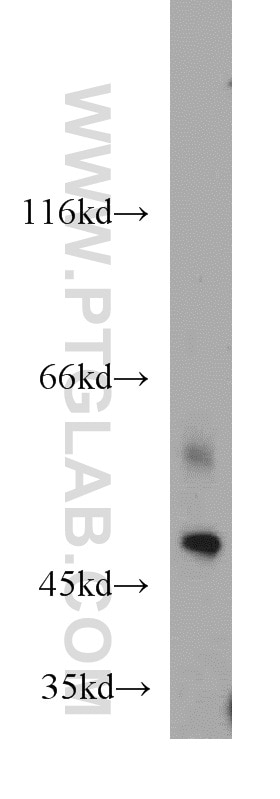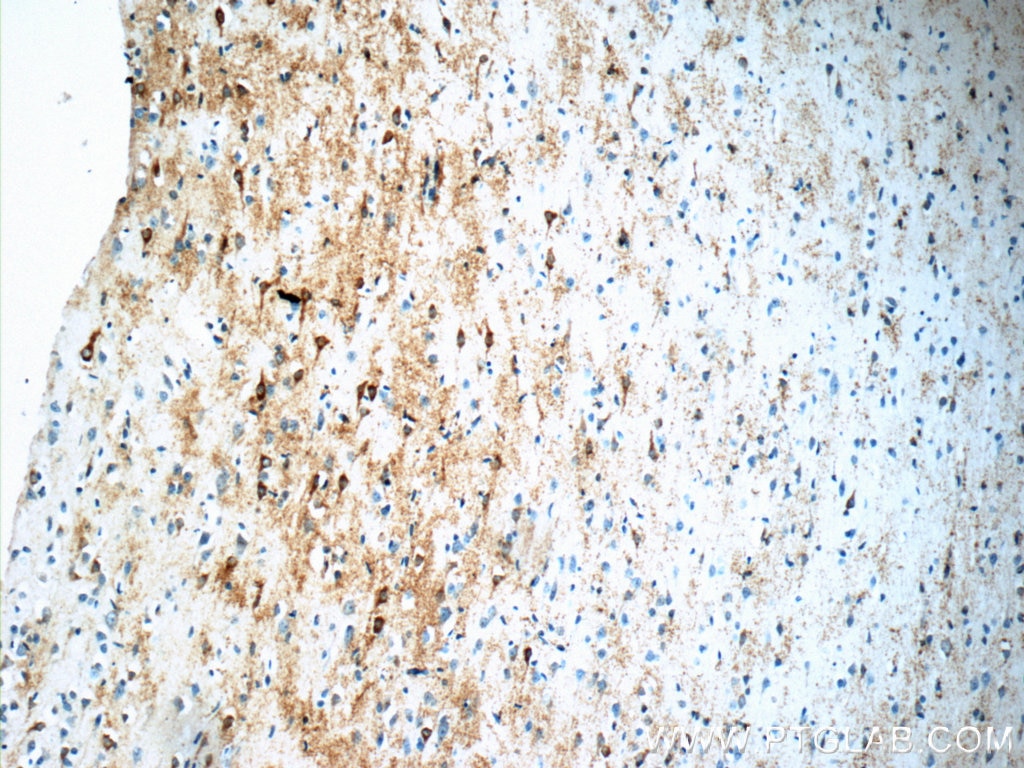Kir2.1 Polyklonaler Antikörper
Kir2.1 Polyklonal Antikörper für WB, ELISA
Wirt / Isotyp
Kaninchen / IgG
Getestete Reaktivität
human, Maus, Ratte und mehr (1)
Anwendung
WB, IHC, ELISA
Konjugation
Unkonjugiert
Kat-Nr. : 19965-1-AP
Synonyme
Geprüfte Anwendungen
| Erfolgreiche Detektion in WB | A549-Zellen |
Empfohlene Verdünnung
| Anwendung | Verdünnung |
|---|---|
| Western Blot (WB) | WB : 1:200-1:1000 |
| It is recommended that this reagent should be titrated in each testing system to obtain optimal results. | |
| Sample-dependent, check data in validation data gallery | |
Veröffentlichte Anwendungen
| WB | See 11 publications below |
| IHC | See 2 publications below |
Produktinformation
19965-1-AP bindet in WB, IHC, ELISA Kir2.1 und zeigt Reaktivität mit human, Maus, Ratten
| Getestete Reaktivität | human, Maus, Ratte |
| In Publikationen genannte Reaktivität | human, Kaninchen, Maus, Ratte |
| Wirt / Isotyp | Kaninchen / IgG |
| Klonalität | Polyklonal |
| Typ | Antikörper |
| Immunogen | Peptid |
| Vollständiger Name | potassium inwardly-rectifying channel, subfamily J, member 2 |
| Berechnetes Molekulargewicht | 48 kDa |
| Beobachtetes Molekulargewicht | 50 kDa, 60 kDa |
| GenBank-Zugangsnummer | NM_000891 |
| Gene symbol | Kir2.1 |
| Gene ID (NCBI) | 3759 |
| Konjugation | Unkonjugiert |
| Form | Liquid |
| Reinigungsmethode | Antigen-Affinitätsreinigung |
| Lagerungspuffer | PBS with 0.02% sodium azide and 50% glycerol |
| Lagerungsbedingungen | Bei -20°C lagern. Nach dem Versand ein Jahr lang stabil Aliquotieren ist bei -20oC Lagerung nicht notwendig. 20ul Größen enthalten 0,1% BSA. |
Hintergrundinformationen
KCNJ2, also named as HHBIRK1, HHIRK1, IRK1, KIR2.1, LQT7 and SQT3, belongs to the inward rectifier-type potassium channel family. KCNJ2 probably participates in establishing action potential waveform and excitability of neuronal and muscle tissues. Inward rectifier potassium channels are characterized by a greater tendency to allow potassium to flow into the cell rather than out of it. Their voltage dependence is regulated by the concentration of extracellular potassium; as external potassium is raised, the voltage range of the channel opening shifts to more positive voltages. The inward rectification is mainly due to the blockage of outward current by internal magnesium. KCNJ2 can be blocked by extracellular barium or cesium. Defects in KCNJ2 are the cause of long QT syndrome type 7 (LQT7). Defects in KCNJ2 are the cause of short QT syndrome type 3 (SQT3). The antibody recognizes the C-term of KCNJ2.
Protokolle
| PRODUKTSPEZIFISCHE PROTOKOLLE | |
|---|---|
| WB protocol for Kir2.1 antibody 19965-1-AP | Protokoll herunterladen |
| IHC protocol for Kir2.1 antibody 19965-1-AP | Protokoll herunterladenl |
| STANDARD-PROTOKOLLE | |
|---|---|
| Klicken Sie hier, um unsere Standardprotokolle anzuzeigen |
Publikationen
| Species | Application | Title |
|---|---|---|
Nat Commun Kir2.1-mediated membrane potential promotes nutrient acquisition and inflammation through regulation of nutrient transporters. | ||
Cell Commun Signal KCNJ2/HIF1α positive-feedback loop promotes the metastasis of osteosarcoma | ||
Stem Cell Res Ther Overexpression of KCNJ2 enhances maturation of human-induced pluripotent stem cell-derived cardiomyocytes | ||
Int Immunopharmacol Salidroside treatment decreases the susceptibility of atrial fibrillation in diabetic mice by reducing mTOR-STAT3-MCP-1 signaling and atrial inflammation | ||
J Mol Cell Cardiol Altered long non-coding RNA expression profile in rabbit atria with atrial fibrillation: TCONS_00075467 modulates atrial electrical remodeling by sponging miR-328 to regulate CACNA1C. | ||
J Cell Sci Kir2.1 channel regulates macrophage polarization via Ca2+/CaMK II/ERK/NF-κB signaling pathway. |




